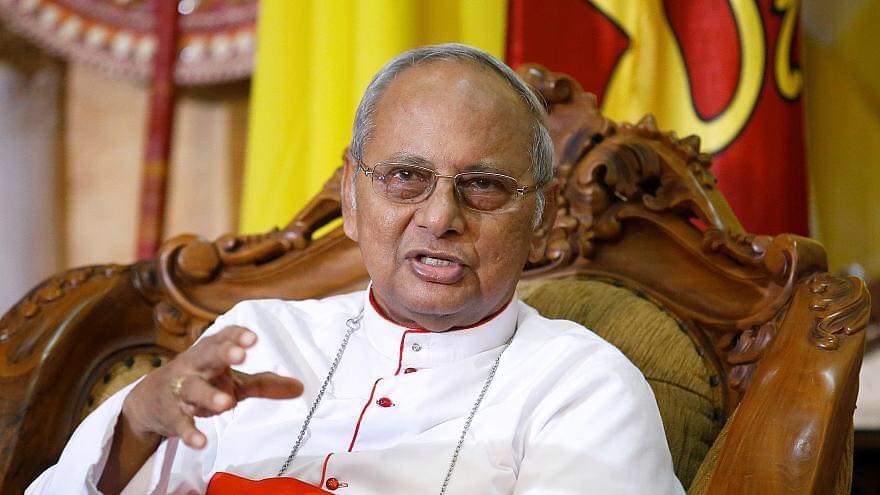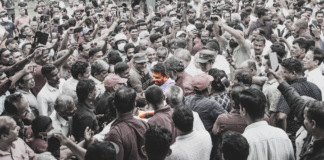- Devolution of power to the provinces
- Health Minister Keheliya Rambukwella must resign
There has been a surfeit of relentless criticism over His Eminence Archbishop Malcolm Cardinal Ranjith’s stand on various issues where he has expressed his views without fear.
Some of his views have hurt government leaders and they are desperately trying to discredit him.
Others are of the opinion that the Archbishop has also exceeded his limit in attacking the government without forbearance, patience and restraint.
It is up to the people to decide whether the Archbishop is on the right side given his political beliefs.
Notwithstanding all that, Malcolm Cardinal Ranjit as Archbishop of Colombo has the sole right to speak out on behalf of his flock who are still suffering the after-shocks of the Easter Sunday bombings.. Nobody should have reservations about the Cardinal’s mission to not only seek justice for the victims but to also unearth who was behind the carnage. The Cardinal’s mission has become even more purposeful and urgent in light of the government’s pussyfooting to punish those who were behind the attacks.
In the current social milieu, the Archbishop has an enormous task to seek the truth. For this, he is poised not to leave a single stone unturned.. He has to carefully sift through the available avalanche of evidence and discover the truth behind the allegations. He needs to be just and unbiased in his judgement and strive to find the truth and ensure justice is served.
Any citizen for that matter including the Archbishop can appeal to the government not to appoint someone who has not even demonstrated the ability to hold any kind of high office in government. The person the Archbishop refers to is Senior Deputy Inspector General of Police Deshabandu Tennakoon, who is tipped to be the next police chief.
Tennakoon has been accused of dereliction of duties and ignored repeated warnings from neighbouring India about an impending attack on significant places in Colombo. This included places of religious worship. Despite repeated warnings, the SDIG in question failed to prevent the attack, resulting in the death of hundreds of innocent people. The top brass of the police had ignored what was going to happen knowing the disastrous consequences. This was considered a blatant dereliction of duties.
. If one of them is given the responsibility to head the Police department it will tarnish its image. The law and order situation in the country will plunge to an all-time low.
The Defence Secretary at the time Hemasiri Fernando admitted they knew such a thing. However, he could not fathom the magnitude of the terror about to unfold.
In that sense, if the Archbishop opposes an appointment though it is the prerogative of the President and the Constitutional Council there is no harm in pursuing the matter in the larger interest of society.
This is why he strongly opposes the appointment of Tennakoon to the coveted position. It is common knowledge of how he behaved during the popular people’s uprising against the Gotabaya Rajapaksa administration last year. He has proven beyond reasonable doubt that he will take the police department to an unprecedented depth that will not be easy to salvage or revive.
Although several top-notch Buddhist monks have opposed the Archbishop’s sentiments there is substance to what he has said. His case against Tennakoon merits serious review if the government intends to put him in the saddle to lead the police.
The Archbishop has written to the head of the Constitutional Council and the Speaker who has voiced his disapproval of the Archbishop’s missive stating it is inappropriate.
The Archbishop has explored all avenues to prevent something drastic from happening to the Sri Lankan social fabric as a result of his quest for justice. There may have been certain excesses by the Archbishop. However, launching scathing attacks on a religious dignitary will not augur well for the organisation which is engaging in it.
It is not a secret that the Archbishop was close to former President Mahinda Rajapaksa. He was even instrumental in bringing Gotabaya Rajapaksa to the helm with a sizable Catholic vote. However, the failure of the Rajapaksa administration to find the truth about the Easter Sunday carnage put the Archbishop in an awkward position. President Ranil Wickremesinghe is being attacked for not conducting an international investigation into the Easter attack as promised.
The modus operandi of Wickremesinghe’s ascension to the Presidency is not relevant since it was done according to the constitutional provisions stipulated in the 1978 constitution. There was precedence created by former President D.B. Wijetunga.
However, his entry to parliament through the national list was done after much deliberation after tossing a number of names for the national list slot. Wickremesinghe failed to obtain the number of preferences at the Parliamentary general elections to be elected as a Member of Parliament from the Colombo district. He polled the highest number of votes at the previous general election after 2015. Hence there is a moral question hanging over the UNP whether a defeated candidate could be nominated to the national list. Someone could argue back saying there had been so many instances where defeated candidates have been appointed as national list members of the House. Some argue what is important is rather than verifying whether his appointment was strictly within the ambit of the law and accepted democratic principles, to look at what he is doing now as the President to salvage the country from an economic precipice.
The Catholic Church remained a strong UNP ally after confronting the Sirimavo Bandaranaike government over the government takeover of Catholic schools in 1962. There was a standoff between the government and the Catholic Church. Eventually, the Church gave in but retained several prominent schools under its feathers. After fifty years of ownership, the schools maintained the same prominence.
Following Chandrika Kumaratunga’s election to the presidency, the Catholic Church took a U-turn when Catholics voted for Chandrika Kumaratunga in the 1994 presidential elections. From that point on, the affinity between the Catholic Church and the centre-left political parties grew tremendously. This has been largely attributed to the progressive policies of Chandrika Kumaratunga, who was seen as a leader who was pro-poor and pro-women, and who had a strong commitment to resolving the ethnic conflict in Sri Lanka.
At the same time, a section of the Catholic Church has found new trends in its affinity with the JVP. Hence, they have developed close connections with the left-oriented JVP, which is an up-and-coming party and an innovative proposition as far as they are concerned. In addition, the JVP’s policy of non-alignment and its strong stand against religious extremism have resonated with the Catholic Church.
The Ranil Wickremesinghe government is encumbered and loaded with governance issues. Among them is the health crisis unfolding in the country’s hinterlands which has raised many questions about drugs imported under the Indian credit line. The main accusation is directed at Health Minister Keheliya Rambukwella for procuring substandard drugs from unregistered Indian suppliers. A young girl died at the Peradeniya Hospital after administering Ceftriaxone. Two more patients were admitted to the Intensive Care Unit with allergic complications, forcing authorities to withdraw the drug from the Peradeniya Teaching Hospital and the Kandy General Hospital. However, according to health ministry sources, Ceftriaxone is still used in other hospitals.
An infant died following a periodic vaccination in Hettipola in the Kurunegala district, raising alarm among parents. Furthermore, nearly 300 doctors who have gone overseas for specialization in various fields have not returned, leaving provincial hospitals with a severe shortage of physicians.
Minister Rambukwella appointed a seven-member expert committee to look into recent incidents of allergic reactions to drugs and their aftereffects in several healthcare institutions
The committee is led by Medical Research Institute Director Dedunu Dias. The committee comprises Prof. Chandima Jeewandara, Prof. Priyadarshani Galappaththi, Dr. Senitha Liyanage, Prof. Nithushi Samaranayake, Prof. S.S.P. Warnakulasuriya, and Dr. Philip H. Li.
Notwithstanding the expert committee report, the government should take immediate measures to stop substandard drug importation. This is for patients’ well-being and access to quality medications. If substandard drugs enter the country, it will lead to serious health complications and even death. Immediate action must be taken to protect the health of the people.
The opposition Samagi Jana Balawegaya has vowed to take the Health Minister to task over the deteriorating condition of the free health services provided to the people for a long time. The Minister has not realised the seriousness of the issue. He has reportedly said that no one should expect people admitted to hospitals to be discharged with no issues plaguing them. That is why government hospitals have funeral parlours. The minister’s clownish comments have not been received well by the people and the media. There are moves by the opposition to bring a no-confidence motion against Rambukwella. However, Rambukwella and the Sri Lanka Podujana Peramuna (SLPP) are determined to face it. They say that the SLPP will support Rambukwella to survive the no-confidence motion.
Rambukwella must take responsibility for the alleged importation of substandard drugs. This has tarnished the image of Sri Lanka’s health services which maintained high standards for a long time. Unlike in other countries, it is not the norm in Sri Lanka for Ministers to take responsibility for public mishaps and resign from their jobs. A minority of Ministers such as M.D.H Jayawardene, Gamini Jayasuriya, and Shelton Ranaraja have been principled enough to resign when they couldn’t agree with government policy. Were Rambukwella, who has a less than desirable record of public service sets a precedent and steps down, the people will view him in a better light than they would if he continues to sit tight
Meanwhile, the President held extensive discussions with Tamil party representatives about the devolution of power. He also discussed the full implementation of the 13th Amendment to the Constitution. The President agreed to devolve power to provinces while retaining police powers at the Centre.
Other matters that were discussed were the implementation of the 13th Amendment, a constitutional amendment to safeguard the full powers of the Provincial Council under List 1 (with the exception of Police Powers) and the inclusion of specified functions in List III in the Provincial Councils List subject to agreement among political arties in Parliament.
The government will also push bills through Parliament to make devolution meaningful.
Among the Bills to be presented to Parliament are the appointment of Divisional Secretaries, giving effect to the Provincial Council’s powers in respect of Education List 1 Schedule iii, establishing Provincial Boards for Vocational and Technical Training, empowering the Provincial Councils to establish universities, empowering Provincial Councils to undertake agricultural modernization and all agricultural grass root services, establishing a Provincial Tourism Promotion Board, raising the limit for national industries from Rs. 1 million to Rs. 250 million in the Industrialization Act, and establishing District Development Councils adhering to the 13th Amendment.
Some of the subjects and functions devolved to the Provincial Councils are still administered by the Central Government. Legislation may be required to ensure that such subjects come under the purview of the Provincial Councils.
The challenging task for the government is to get the various political parties in the opposition and coalition partners of the government to agree to the devolution package. This is the legitimate right of people living in provinces to decide on their future. However, the TNA has already rejected the package as a hollow promise and will not agree to anything that’s devoid of police powers. (Also read the Indian Foreign Secretary’s media briefing published elsewhere in this website.)





